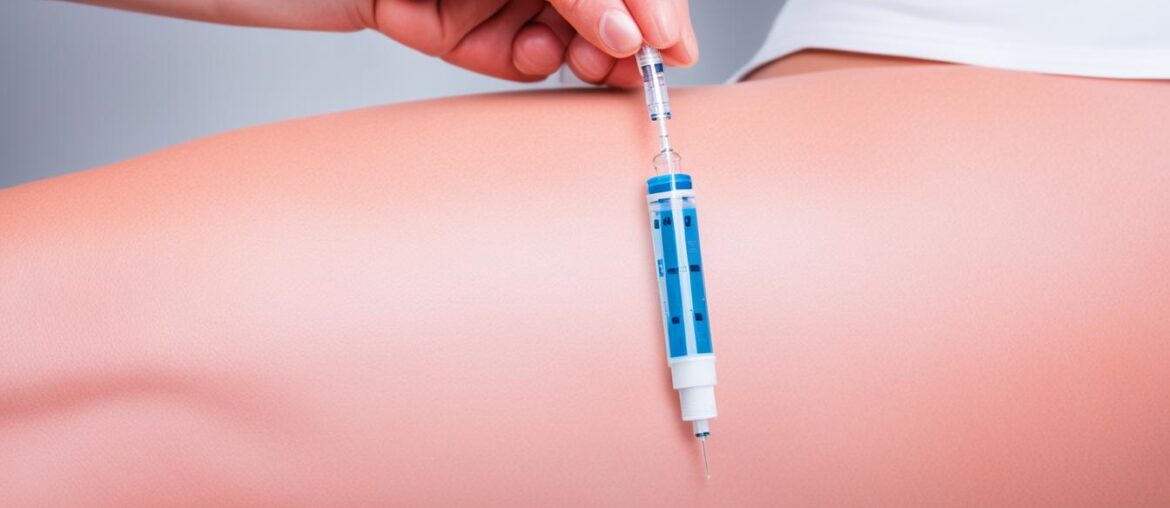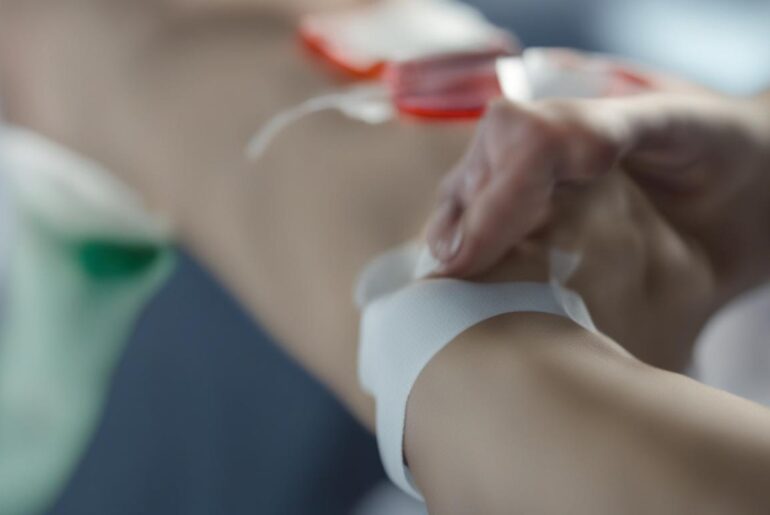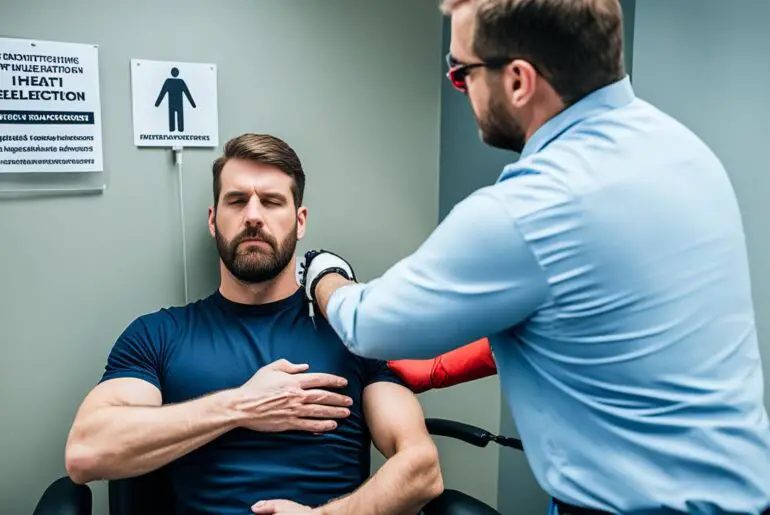Did you know that administering HCG injections safely is crucial to ensure proper treatment and avoid potential risks? Whether you’re using HCG injections for fertility treatment or other medical purposes, it’s essential to follow the correct guidelines for safe administration. By understanding the step-by-step process and best practices, you can ensure the effective and secure use of HCG injections.
So, how exactly do you administer HCG injections safely? In this comprehensive guide, I will walk you through each step of the process, from preparing the injections to selecting the right injection site. You’ll learn the proper techniques for both subcutaneous and intramuscular injections and gain insights into the dosing and frequency recommendations. Additionally, I’ll provide tips for storing and handling HCG medication to maintain its potency and safety.
Whether you’re new to HCG injections or looking for a refresher, this guide will equip you with the knowledge and confidence to administer HCG injections safely and effectively. Let’s dive in!
Key Takeaways:
- Administering HCG injections safely is crucial for proper treatment and avoiding potential risks.
- Understanding the step-by-step process and guidelines ensures the effective and secure use of HCG injections.
- Proper preparation, injection site selection, and injection techniques are key factors in safe administration.
- Following the recommended dosing and frequency guidelines provided by healthcare providers is essential.
- Proper storage and handling of HCG medication help maintain its potency and safety.
Understanding HCG and its Uses
HCG, or human chorionic gonadotropin, is a hormone that is naturally produced during pregnancy. However, it is also used for medical purposes, such as fertility treatment.
In women, HCG injections are commonly used to stimulate ovulation and enhance fertility. These injections can help regulate the menstrual cycle and increase the chances of successful conception. HCG injections are often used in conjunction with other fertility treatments, such as in-vitro fertilization (IVF), to support the growth and release of mature eggs.
In men, HCG injections can play a role in improving fertility as well. By stimulating the production of testosterone, HCG injections can help improve sperm count and motility. This can increase the chances of successful conception for couples struggling with male infertility.
Understanding the purpose of HCG injections in female and male fertility is crucial for safe and effective administration. By working closely with healthcare providers and fertility specialists, individuals can optimize their chances of achieving their family planning goals.
“HCG injections are commonly used to stimulate ovulation and enhance fertility in women.”
“HCG injections can help stimulate testosterone production and improve sperm count in men.”
Proper Preparation for HCG Injections
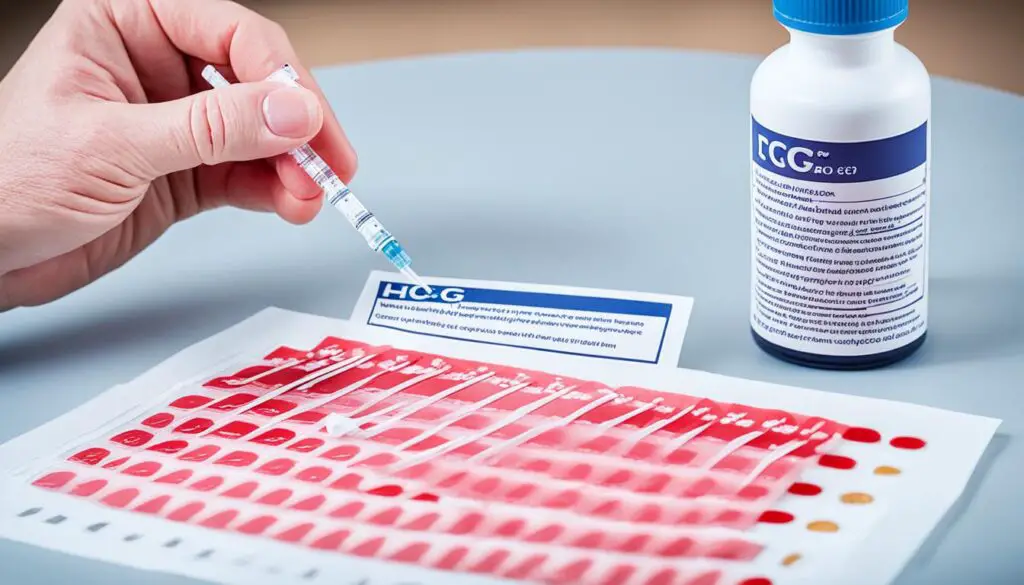
Before administering HCG injections, it is crucial to prepare properly to ensure safe and effective treatment. The following steps will guide you through the preparation process:
- Gather the necessary supplies: To administer HCG injections, you will need alcohol wipes, syringes, and medication vials. Having all the supplies readily available will streamline the injection process.
- Mix the HCG medication: If your HCG medication is in powder form, it needs to be mixed with the provided sterile water. Follow the instructions provided by your healthcare provider or pharmacist to ensure accurate preparation.
- Store the prepared medication: Once the HCG medication is properly mixed, it should be stored in the refrigerator until you are ready to administer the injection. This helps maintain the integrity and effectiveness of the medication.
By following these preparation steps, you can ensure that your HCG injections are administered safely and effectively. Now that you are prepared, let’s move on to understanding the importance of selecting the right injection site for HCG injections in the next section.
Image:
Selecting the Injection Site
When it comes to administering HCG injections, selecting the right injection site is crucial for safe and effective treatment. The specific instructions provided by your healthcare provider will determine the best places to inject HCG. Generally, there are two common methods: subcutaneous injections and intramuscular injections.
Subcutaneous Sites:
- The lower abdomen is a popular site for subcutaneous injections due to the presence of subcutaneous fat. It offers a convenient and accessible location for injection.
- The front or outer thigh is another suitable area for subcutaneous injections. It provides a larger surface area and ample subcutaneous fat for comfortable administration.
- The upper arm is also frequently used for subcutaneous injections. This site is easily accessible for self-injection and has sufficient fat tissue for proper absorption of the medication.
Intramuscular Sites:
- The outer arm is a commonly recommended site for intramuscular injections. It provides easy access and sufficient muscle mass for effective absorption of the injected medication.
- The upper outer buttocks is another suitable area for intramuscular injection. The well-developed gluteal muscles in this region allow for proper absorption and minimize discomfort during the injection.
Remember, it is vital to follow the specific guidelines provided by your healthcare provider regarding injection sites. This ensures the accurate and safe administration of HCG injections, maximizing the effectiveness of the treatment.
Step-by-Step Guide for Subcutaneous Injections
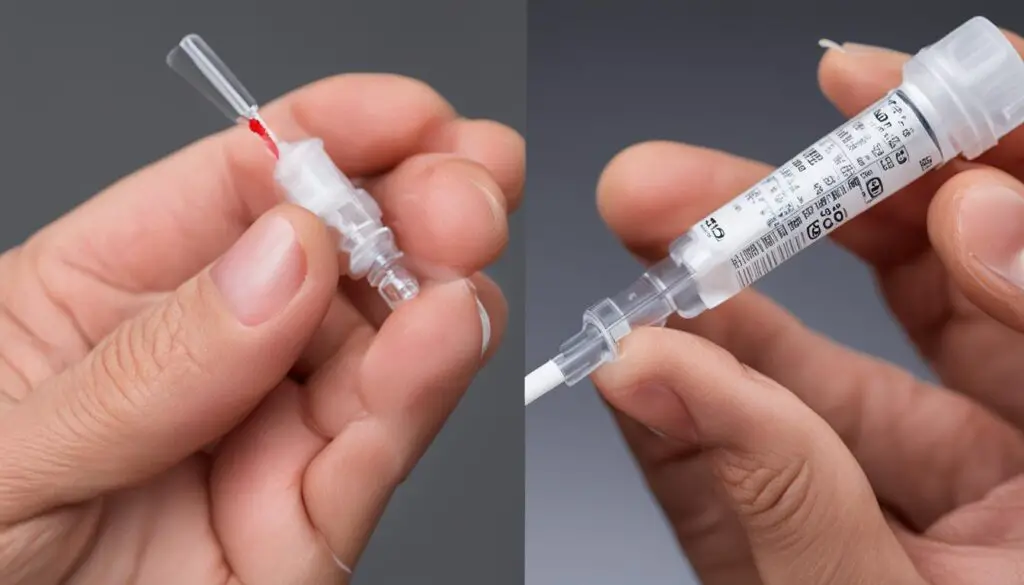
If you need to administer HCG subcutaneously, it’s important to know the proper technique for a safe and accurate injection. Follow these step-by-step instructions to ensure the successful administration of subcutaneous HCG injections.
-
Begin by gathering all the necessary supplies, including alcohol wipes, a syringe, and the HCG medication.
-
Wash your hands thoroughly with soap and water to maintain proper hygiene.
-
Choose a clean and well-lit area for the injection and make sure you have a comfortable surface to lean on.
-
Remove the protective cap from the needle and inspect it for any damage or bending.
-
Pinch a fold of skin in the designated injection site, typically the upper arm, lower abdomen, or front or outer thigh. The pinch should be firm but not overly tight.
-
Hold the syringe like a pencil and insert the needle into the pinched fold of skin at a 90-degree angle. Be gentle and steady while inserting the needle.
-
Once the needle is inserted, use your thumb to slowly depress the plunger, injecting the HCG medication into the subcutaneous layer of fat. Proceed with caution to avoid discomfort or pain.
-
Hold the syringe steady for a few seconds to ensure the complete delivery of the medication.
-
Withdraw the needle by gently pulling it out at the same angle it was inserted.
-
Apply gentle pressure to the injection site with a clean cotton ball or alcohol pad.
-
If necessary, cover the injection site with a bandage to prevent any potential irritation.
-
Dispose of the syringe, needle, and any other used supplies in a proper sharps container.
Remember, always follow the instructions provided by your healthcare provider and consult with them if you have any questions or concerns about administering subcutaneous HCG injections.
Step-by-Step Guide for Intramuscular Injections
When administering HCG intramuscularly, it is crucial to follow the proper technique to ensure safe and effective injection. Here is a step-by-step guide:
- Begin by stretching the skin over the injection site, creating a taut surface to facilitate needle insertion.
- Hold the syringe with a firm grip, positioning the needle at a 90-degree angle to the skin’s surface.
- Slowly insert the needle into the muscle, using a steady and controlled motion. It is important to maintain a consistent angle throughout the injection.
- Once the needle is properly inserted, depress the plunger slowly to administer the HCG medication into the muscle.
- After the medication has been injected, carefully withdraw the needle from the muscle at the same angle it was inserted.
Remember to dispose of the needle properly in a sharps container, following the appropriate medical waste disposal guidelines. If necessary, apply pressure to the injection site with a sterile cotton ball or gauze to minimize any bleeding.
Benefits of Intramuscular Injections
Intramuscular injections offer several advantages when administering HCG:
- Effective absorption: Injecting HCG into the muscle allows for efficient absorption into the bloodstream, ensuring the medication reaches its intended target effectively.
- Reduced pain at injection site: Compared to subcutaneous injections, intramuscular injections often result in less discomfort due to the presence of fewer nerve endings in muscle tissue.
- Larger volume administration: Intramuscular injections can accommodate a larger volume of medication, making them suitable for HCG doses that require a higher concentration.
By following the proper intramuscular injection technique, individuals can ensure the safe and accurate administration of HCG. If you have any concerns or questions about the injection process, consult with your healthcare provider for personalized guidance.
Proper Dosing and Frequency of HCG Injections
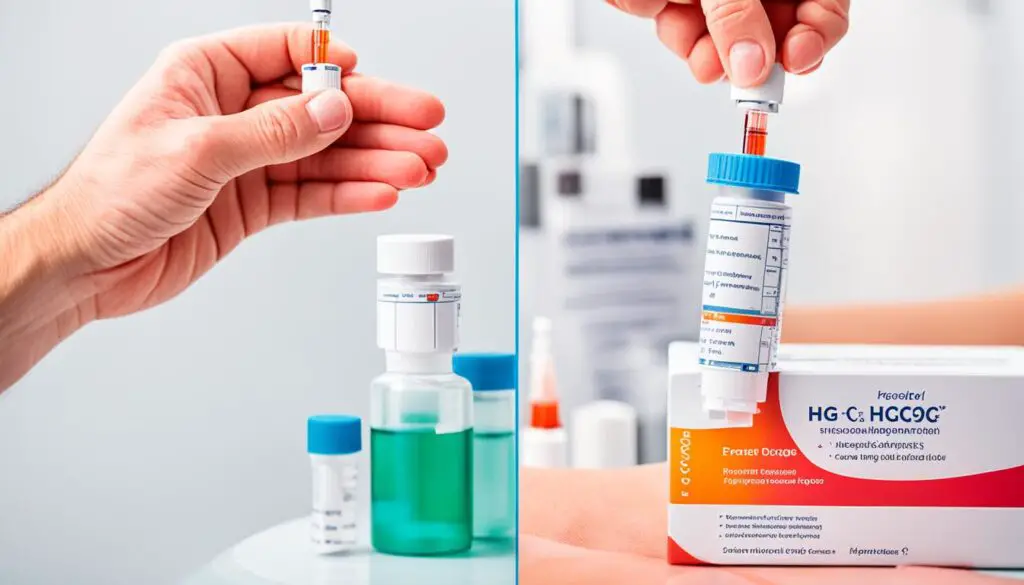
When it comes to HCG injections, proper dosing and frequency are key to achieving successful treatment outcomes. The dosing information for HCG can vary depending on an individual’s specific needs as determined by their healthcare provider. It is essential to follow the prescribed dosing and frequency guidelines to ensure the safe and effective use of HCG.
The dosage of HCG is typically measured in units, and the appropriate amount is drawn up into the syringe for injection. Your healthcare provider will determine the optimal dosage based on factors such as your medical condition, weight, and individual hormone levels. It is important to adhere to their recommended dosing instructions for optimal results.
Additionally, the frequency of HCG injections will be determined by your healthcare provider. Some individuals may require daily injections, while others may have a different schedule. Your healthcare provider will create an individualized dosing schedule for HCG that aligns with your specific treatment goals.
Remember, it is crucial to follow your healthcare provider’s instructions regarding the dosing and frequency of HCG injections. Deviating from the recommended guidelines could compromise the effectiveness of the treatment and may result in undesirable outcomes.
| Condition | Dosage | Frequency |
|---|---|---|
| Female fertility treatment | XXX units | Once daily for X days |
| Male fertility treatment | XXX units | Every X days for X weeks |
| Weight loss | XXX units | Once weekly for X weeks |
Table: Recommended HCG Dosing Guidelines
Storing and Handling HCG Medication
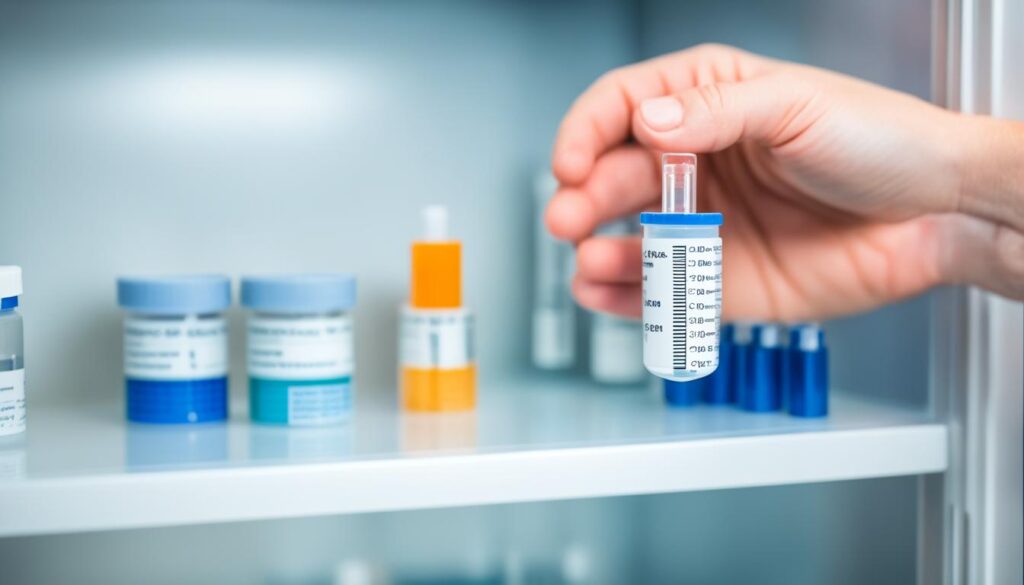
Proper storage and handling of HCG medication are critical for maintaining its efficacy and ensuring patient safety. Following the recommended guidelines for storing HCG can help preserve its potency and integrity.
Once the HCG medication has been reconstituted, it is important to refrigerate it promptly. Keeping the medication at a cool temperature helps to maintain its effectiveness. Additionally, reconstituted HCG should be used within a specific timeframe to ensure optimal results.
The shelf life of reconstituted HCG varies, but it typically ranges from 60 to 90 days. It is essential to check the specific storage instructions provided with the medication and adhere to them diligently. Using expired or improperly stored HCG medication can lead to decreased efficacy and compromised treatment outcomes. Therefore, it is crucial to follow the recommended guidelines to ensure the potency and safety of the medication.
For proper handling, always take care to prevent contamination of the HCG medication. Avoid touching the needle or any part of the syringe that comes into contact with the medication to minimize the risk of introducing harmful bacteria. Following proper hygiene practices, such as washing hands before handling the medication, can help maintain its sterility.
Remember, storing and handling HCG medication correctly is vital for the success of your treatment. If you have any concerns or questions about storing or handling your HCG medication, consult your healthcare provider or pharmacist for guidance.
| Storage Guidelines for HCG Medication | Shelf Life of Reconstituted HCG |
|---|---|
| Refrigerate the medication after reconstitution | 60-90 days |
| Follow the specific storage instructions provided | |
| Avoid touching the needle or syringe with bare hands |
HCG Access and Availability
Recent FDA regulations have had a significant impact on the availability of HCG medication. These regulations limit its availability as a compounded prescription, resulting in shortages and increased costs for patients seeking HCG treatment. It is crucial for individuals to stay informed about the current regulations and seek guidance from healthcare providers or specialized clinics for access to HCG and assistance in navigating the regulations.
Impact of FDA Regulations on HCG Availability
The FDA regulations on HCG have imposed stricter limitations on its compounding and distribution. This has led to a decrease in the number of pharmacies offering compounded HCG medication, resulting in limited access for patients. The regulations aim to ensure the safety and efficacy of HCG medication, but they have caused challenges for individuals seeking this treatment option.
Patients may experience difficulties in finding pharmacies that can provide HCG medication, as not all pharmacies are equipped to meet the new regulatory requirements. This limited availability has resulted in increased costs for HCG treatment, as patients may need to turn to specialized clinics or pharmacies that can fulfill their prescription.
For individuals seeking HCG treatment, it is vital to reach out to healthcare providers or specialized clinics that have experience in prescribing and administering HCG injections. These experts can provide guidance and assistance in navigating the regulations to ensure access to HCG medication.
One trusted resource is Defy Medical, a specialized clinic that focuses on hormone replacement therapy, including HCG treatment. Defy Medical is well-versed in the current FDA regulations and can provide comprehensive support to individuals seeking HCG access. They offer telemedicine services, making it accessible to patients across the United States.
By seeking the guidance of healthcare providers or specialized clinics like Defy Medical, individuals can navigate the regulatory landscape and obtain the necessary HCG medication for their treatment. This support ensures that patients can safely and effectively incorporate HCG into their healthcare regimen.
HCG Availability and Patient Support
Ensuring access to HCG medication is crucial for individuals who can benefit from this therapeutic option. It is essential to stay up to date with any changes in FDA regulations and seek guidance from healthcare providers or specialized clinics to overcome potential barriers in accessing HCG.
To learn more about HCG access and availability, and to get expert guidance on HCG treatment, consider consulting healthcare providers or specialized clinics like Defy Medical. They offer personalized support to assist individuals in navigating the regulations and ensuring safe and effective HCG administration.
| HCG Access and Availability | Benefits | Considerations |
|---|---|---|
| Restricted availability | – Obtaining HCG for treatment – Access to specialized clinics |
– Limited number of pharmacies offering compounded HCG – Increased costs for HCG medications |
| Navigating regulations | – Expert guidance from healthcare providers or specialized clinics – Access to telemedicine services |
– Stay informed about FDA regulations – Seek professional support to understand and overcome barriers |
| Patient support | – Ensuring access to HCG medication – Assistance in navigating regulations |
– Stay up to date with regulatory changes – Seek guidance from healthcare providers or specialized clinics |
Conclusion
Administering HCG injections safely is of utmost importance to ensure successful treatment and minimize potential risks. By following proper techniques for preparation, injection site selection, and injection administration, individuals can ensure the safe and effective use of HCG. Consulting with healthcare providers or specialized clinics throughout the HCG treatment process is vital for ongoing guidance and support.
During the administration of HCG injections, it is essential to carefully adhere to the guidelines provided by healthcare professionals. The process involves cautious preparation, such as gathering the necessary supplies and correctly storing the HCG medication. Choosing the appropriate injection site, whether subcutaneous or intramuscular, is crucial for accurate delivery and optimal treatment outcomes.
Safe administration of HCG injections requires attention to detail and precision. Individuals should be diligent in following the recommended dosing and frequency guidelines provided by their healthcare providers. By maintaining proper storage and handling practices of HCG medication, its efficacy and safety can be preserved for the duration of treatment.
Ensuring safety while administering HCG injections is not only about technique but also about awareness and compliance with FDA regulations. Patients seeking HCG treatment should be aware of the current regulations surrounding its availability as a compounded prescription. Seeking guidance from healthcare providers or specialized clinics can help navigate these regulations and provide access to HCG medication.
FAQ
How do I administer HCG injections safely?
To administer HCG injections safely, you should pinch the skin for a cutaneous injection or stretch it for an intramuscular injection. Gently insert the needle and release the plunger slowly. Wait at least 10 seconds before withdrawing the needle. Following these guidelines will help ensure the safe administration of HCG injections.
What is the purpose of HCG injections?
HCG injections are used for various medical purposes. In women, they are commonly used to stimulate ovulation and enhance fertility. In men, HCG injections can help stimulate testosterone production and improve sperm count. Understanding the uses of HCG injections is essential for safe administration.
How do I properly prepare for HCG injections?
Proper preparation for HCG injections includes gathering all the necessary supplies, such as alcohol wipes, syringes, and medication vials. If the HCG medication is in powder form, it needs to be mixed with the provided sterile water before use. The prepared medication should be stored in the refrigerator until it is ready to be injected. Following these preparation steps will ensure the safe administration of HCG injections.
Where should I inject HCG?
The injection site for HCG injections depends on the specific instructions given by the healthcare provider. Subcutaneous injections are typically administered just under the skin in areas with an ample amount of fat, such as the lower abdomen, front or outer thigh, or upper arm. Intramuscular injections, on the other hand, are administered directly into the muscle and are usually done in the outer arm or upper outer buttocks. Selecting the correct injection site is crucial for safe and effective administration of HCG injections.
How do I perform a subcutaneous injection of HCG?
Subcutaneous injections of HCG involve pinching a fold of skin and inserting the needle at a 90-degree angle. The medication is then slowly injected into the subcutaneous layer of fat. After a few seconds, the needle is removed, and the injection site is covered with a bandage if necessary. Following a step-by-step guide for subcutaneous injections will ensure the safe and accurate administration of HCG.
How do I perform an intramuscular injection of HCG?
Intramuscular injections of HCG require stretching the skin over the injection site and inserting the needle at a 90-degree angle into the muscle. The medication is then slowly injected into the muscle, and the needle is removed afterward. It is important to follow the proper technique for intramuscular injections to ensure the safe and effective administration of HCG.
What is the proper dosing and frequency of HCG injections?
The dosing and frequency of HCG injections may vary depending on the individual’s specific needs and healthcare provider’s instructions. The dosage is typically measured in units, and the appropriate amount is drawn up into the syringe for injection. It is important to follow the recommended dosing and frequency guidelines provided by the healthcare provider to ensure the safe and effective use of HCG.
How should I store and handle HCG medication?
Proper storage and handling of HCG medication are essential for maintaining its efficacy and safety. Once the HCG medication is reconstituted, it should be refrigerated and used within a specific timeframe. The shelf life of reconstituted HCG varies but is typically around 60-90 days. It is important to follow the storage instructions provided with the medication to ensure its potency and safety.
How do FDA regulations affect the availability of HCG medication?
The availability of HCG medication has been affected by recent FDA regulations, limiting its availability as a compounded prescription. This has led to shortages and increased costs for patients seeking HCG treatment. It is important for individuals to be aware of the current regulations and seek guidance from healthcare providers or specialized clinics, such as Defy Medical, for access to HCG and assistance in navigating the regulations.
How can I ensure the safety of administering HCG injections?
Administering HCG injections safely is crucial for successful treatment and avoiding potential risks. By following the proper techniques for preparation, injection site selection, and injection administration, individuals can ensure the safe and effective use of HCG. It is important to consult with healthcare providers or specialized clinics for guidance and support throughout the HCG treatment process.

